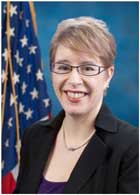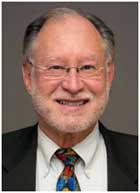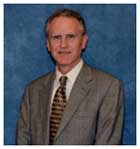 |
Stuart Altman Stuart Altman is Dean of The Heller School for Social Policy & Management and Sol C. Chaikin Professor of National Health Policy at Brandeis University. He has MA and PhD degrees in economics from the University of California, Los Angeles and taught at Brown University and the Graduate School of Public Policy at the University of California, Berkeley. Dr. Altman is an economist whose research interests are primarily in the area of federal and state health policy. Among his many professional achievements, he served 12 years as Chairman of the congressionally legislated Prospective Payment Assessment Commission, formed to advise Congress and the Administration on the functioning of the Medicare Diagnostic Related Group Hospital Payment System and other system reforms. He is also Chair of The Health Industry Forum which brings together diverse group leaders from across the health care field to develop solutions for critical problems facing the health care system.
|
||
 |
Dave A. Chokshi Dave A. Chokshi, MD, MSc, is Director of Population Health Improvement and Assistant Professor of Medicine and Population Health at New York University (NYU) Langone Medical Center. He practices primary care at the NYU Internal Medicine Associates clinic. He is also Senior Advisor to the Commissioner at the New York State Department of Health. Dr. Chokshi served as a 2012-13 White House Fellow at the U.S. Dept. of Veterans Affairs, where he was the principal health and medical advisor to Secretary Eric Shinseki. His prior work experience spans the public, private, and nonprofit sectors, including positions with the New York City Department of Health, the Louisiana Department of Health, a startup clinical software company, and the Patient-Centered Outcomes Research Institute. Dr. Chokshi helped grow the nonprofit Universities Allied for Essential Medicines (UAEM), dedicated to improving access to medicines in developing countries; he was a founding member of UAEM's Board of Directors. He has done clinical work in Guatemala, Peru, Botswana, Ghana, and India. Dr. Chokshi has written extensively on medicine and public health in The New England Journal of Medicine, JAMA, Lancet, Health Affairs, and Nature. He is also a contributor to The Atlantic and is on the Medical Review Board of The Huffington Post. He trained in internal medicine at Brigham & Women's Hospital, where he practiced primary care at the Southern Jamaica Plain Health Center, and was a clinical fellow at Harvard Medical School. He received his MD with Alpha Omega Alpha distinction from Penn State University, received an MSc in global public health as a Rhodes Scholar at Oxford University, and graduated summa cum laude and Phi Beta Kappa from Duke University.
|
||
 |
Ceci Connolly Ceci Connolly is the Managing Director of the Health Research Institute at PricewaterhouseCoopers (PwC), a research organization dedicated to objective analysis on the issues, policies, and trends important to health organizations and policymakers. Ms. Connolly is a veteran journalist, author, and commentator who spent 25 years in the news business, reporting on national politics, health care, Latin America, and natural disasters such as Hurricane Katrina. As the national health correspondent for The Washington Post, she chronicled enactment of the Patient Protection and Affordable Care Act and was co-author of Landmark: The Inside Story of America's New Health Care Law and What It Means for Us All. During her years in journalism, Ms. Connolly reported on six U.S. presidential campaigns and was a major contributor to the book Deadlock: The Inside Story of America's Closest Election. She spent more than 2 years based in Mexico City, traveling extensively throughout Latin America. She produced a daily blog on Mexico's 2006 presidential race as well as a multimedia project on HIV-AIDS along the U.S.-Mexico border. Ms. Connolly is a board member for the nonprofit Whitman Walker Health and is the first nonphysician to receive the Mayo Clinic's prestigious Plummer Society Award for promoting deeper understanding of science and medicine. She also serves on the National Advisory Board of the Center for Sustainable Health Spending and was the recipient of a fellowship at Harvard's Kennedy School of Government. Ms. Connolly has appeared on PBS's "Washington Week," "The Early Show" on CBS, NPR's "The Diane Rehm Show," and several news programs on MSNBC and Fox News Channel. She has spoken at the prestigious National Press Club, the Chautauqua Institution, the Cleveland Clinic, and numerous universities and health care conferences. Prior to joining PwC, Ms. Connolly was a Senior Advisor at the McKinsey Center for Health Reform. In her role at the Health Research Institute, Ms. Connolly oversees a team of independent analysts and writers who track major developments across the health care spectrum.
|
||
 |
Paul Ginsburg Paul Ginsburg is Norman Topping Chair in Medicine and Public Policy at the University of Southern California. Continuing to be based in the Washington, DC, area, he teaches graduate health administration courses and conducts health policy research. From 1995 through the end of 2013, he was President of the Center for Studying Health System Change (HSC). Founded with core support from the Robert Wood Johnson Foundation, HSC conducted research to inform policymakers and other audiences about changes in organization, financing and delivery of care and their effects on people. HSC was widely known for the objectivity and technical quality of its research and its success in communicating this research to policymakers, industry leaders, the media, and the research community. HSC enjoys particular respect for its knowledge of developments in communities and health care markets. Before founding HSC, Dr. Ginsburg served as the founding Executive Director of the Physician Payment Review Commission (now the Medicare Payment Advisory Commission). Widely regarded as highly influential, the Commission developed the Medicare physician payment reform proposal that was enacted by the Congress in 1989. Dr. Ginsburg was a Senior Economist at RAND and served as Deputy Assistant Director at the Congressional Budget Office (CBO). Before that, he served on the faculties of Duke and Michigan State Universities. He earned his doctorate in economics from Harvard University. Dr. Ginsburg is a noted speaker and consultant on the changes in the financing and delivery of health care, particularly on the evolution of health care markets. In addition to presentations on the overall direction of change, recent topics have included cost trends and drivers, consumer-driven health care, provider payment reform, future of employer-based health insurance, and competition in health care. As a consultant to the Bipartisan Policy Center, he has contributed to reports on reducing federal spending on health care (2010) and on a strategy to contain health care costs (2013). He has been named to Modern Healthcare's "100 Most Influential Persons in Health Care" eight times. He received the first annual HSR Impact Award from AcademyHealth. He is a founding member of the National Academy of Social Insurance and a Public Trustee of the American Academy of Ophthalmology, served two elected terms on the Board of AcademyHealth, served on CBO's Panel of Health Advisors, and serves on the Health Affairs editorial board.
|
||
 |
Kate Goodrich Kate Goodrich joined the Centers for Medicare & Medicaid Services (CMS) in September 2011, serving as a Senior Technical Advisor to the Director of the Office of Clinical Standards and Quality and the Chief Medical Officer of CMS. In this role, she provides leadership on quality measurement programs and co-leads a CMS-wide task force to align measures across programs and with the private sector as well as a companion U.S. Department of Health and Human Services (HHS)-wide committee. Before coming to CMS, Dr. Goodrich served as a Medical Officer in the Office of the Assistant Secretary for Planning and Evaluation (ASPE). She managed the portfolio of ASPE Comparative Effectiveness Research (CER) projects, including the creation of a multipayer claims database for CER. She was also the Project Manager for the HHS contract with the National Quality Forum. She continues to practice clinical medicine as a Hospitalist and an Associate Professor of Medicine at The George Washington University. |
||
 |
Joanne Kenen Joanne Kenen is the health care editor. Kenen has covered everything from Haitian voodoo festivals to U.S. presidential campaigns. (Sometimes it’s hard to tell the difference.) Since arriving in Washington in 1994, she has focused on health policy and health politics. She joined POLITICO in Sept. 2011. Kenen got the newspaper bug in second grade (the Teeny Town News), spent way too much time at the Harvard Crimson and then found herself in Central America, where she had an Inter American Press Association fellowship. She worked for Reuters in New York, Florida and the Caribbean and Washington. As a Kaiser Family Foundation media fellow in 2006-07, she wrote about aging and palliative care. She spent three years writing and blogging about health policy at the nonpartisan New America Foundation. Her work has appeared in numerous publications including The Atlantic, Kaiser Health News, the Washingtonian, CQ, The Washington Post, the Center for Public Integrity, Health Affairs, AARP’s The Magazine and Bulletin, National Journal, Slate and Miller-McCune. She co-authored two books that have absolutely nothing to do with health: “The Costa Rica Reader” and a parenting book, “The Sleep Lady’s Good Night, Sleep Tight.” One was adopted in college courses. The other one made money. When she isn’t busy trying to figure out what Congress is up to (not that Congress always knows what Congress is up to), she can be found in Bethesda, Md., with her husband, Ken Cohen, and their two sons. When she needs a break from health policy, she writes about her kids, chocolate cake or cross-dressing female pirates.
|
||
 |
Michael Kleinrock Michael Kleinrock, Director of Research Development at IMS Institute, sets the research agenda for the institute, leading the development of reports and projects focused on the current and future role of biopharmaceuticals in health care in the U.S. and globally. Each year, Mr. Kleinrock leads the development of IMS's perspectives included in its annual "Year in Review" presentation, as well as its review of the future outlook for the global pharmaceutical market. He writes and speaks regularly on these and other topics and is sought for his unique and pragmatic perspectives, backed by rigorous analysis and research, on issues of interest to pharmaceutical companies, financial analysts, trade groups, policy advocates, and regulatory agencies. Mr. Kleinrock joined IMS in 1999 and held roles in customer service, marketing, and product management. In 2006, he joined the Market Insights team, which in 2011 became the IMS Institute for Healthcare Informatics. Mr. Kleinrock holds a BA in history and political science from the University of Essex and an MA in journalism and radio production from Goldsmiths College.
|
||
 |
Larry Levitt Larry Levitt is Senior Vice President for Special Initiatives at the Kaiser Family Foundation and Senior Advisor to the President of the Foundation. Among other duties, he is Co-Executive Director of the Program for the Study of Health Reform and Private Insurance. He previously was Editor-in-Chief of kaisernetwork.org, the Foundation's online health policy news and information service, and directed the Foundation's communications and online activities and its Changing Health Care Marketplace Project. Before joining the Foundation, Mr. Levitt served as a Senior Health Policy Advisor to the White House and the U.S. Department of Health and Human Services, working on the development of President Clinton's Health Security Act and other health policy initiatives. Earlier, he was the Special Assistant for Health Policy with California Insurance Commissioner John Garamendi, was a Medical Economist with Kaiser Permanente, and served in a number of positions in the Massachusetts state government. Mr. Levitt holds a bachelor's degree in economics from the University of California, Berkeley and a master's degree in public policy from Harvard University's Kennedy School of Government.
|
||
 |
George Miller George Miller has served on the technical staff of Altarum Institute and one of Altarum's predecessor organizations, Vector Research, Inc., since 1972. He is currently affiliated with Altarum's Center for Sustainable Health Spending, where he participates in the center's efforts to track national health spending, understand the drivers of spending growth, and quantify a sustainable spending growth rate. In other efforts, he has supported Altarum in applications of operations research to modeling and analysis of health care issues that have included topics in the value of prevention, disease management, medical responses to demand surges, cost-effectiveness of clinical interventions, beneficiary population forecasting, telemedicine, graduate medical education, medical logistics, medical staffing, medical facilities planning, and collections forecasting. Dr. Miller's work has been published in the New England Journal of Medicine; the Journal of the American College of Cardiology; Health Affairs; Medical Decision Making; Advances in Health Economics and Health Services Research; Health Care Management Science; Infection Control and Hospital Epidemiology; the International Journal of Disaster Medicine; the Joint Commission Journal on Quality and Patient Safety; Interfaces; Management Science; IEEE Transactions on Systems, Man, and Cybernetics; and IIE Transactions. He frequently serves as a reviewer for several of these journals. Dr. Miller has chaired numerous sessions at national meetings of the Institute for Operations Research and the Management Sciences (INFORMS), served on INFORMS's Long-Range Planning Committee, and served for 7 years (3 years as Chair) of its committee to select the recipient of the Bonder Scholarship for Applied Operations Research in Health Services. Dr. Miller received his BSE, MSE, and PhD degrees in industrial and operations engineering from the University of Michigan, where he subsequently served as an Adjunct Assistant Professor.
|
||
| Harold D. Miller Harold D. Miller is the President and CEO of the Center for Healthcare Quality and Payment Reform.Miller has been working at the local, state, and national levels on initiatives to improve the quality of healthcare services and to change the fundamental structure of healthcare payment systems in order to support improved value.Miller also serves as Adjunct Professor of Public Policy and Management at Carnegie Mellon University. Miller is a nationally-recognized expert on healthcare payment and delivery reform, and has given invited testimony to Congress on how to reform healthcare payment.He has authored a number of papers and reports on health care payment and delivery reform, including “From Volume to Value: Better Ways to Pay for Healthcare,” which appeared in the September 2009 issue of Health Affairs, “Win-Win-Win Approaches to Healthcare Cost Control Through Physician-Led Payment Reform, which appeared in the March 2014 issue of Clinical Gastroenterology and Hepatology, the Center for Healthcare Quality and Payment Reform’s reports How to Create Accountable Care Organizations,Transitioning to Accountable Care, and Ten Barriers to Healthcare Payment Reform and How to Overcome Them, the Network for Regional Healthcare Improvement’s report Making the Business Case for Payment and Delivery Reform, the Massachusetts Hospital Association’s report Creating Accountable Care Organizations in Massachusetts,the American Medical Association’s report Pathways for Physician Success Under Healthcare Payment and Delivery Reforms, the Medical Society of Virginia’s report How Virginia Physicians Can Improve the Quality and Reduce the Costs of Health Care Through Payment and Delivery Reforms, and the Association of Departments of Family Medicine’s report Leading the Way in Accountable Care: How Departments of Family Medicine Can Help Create a Higher Quality, More Affordable Healthcare System. From 2008 to 2013, Miller served as the President and CEO of the Network for Regional Healthcare Improvement (NRHI), the national association of Regional Health Improvement Collaboratives, and he organized NRHI’s national Summits on Healthcare Payment Reform in 2007 and 2008 and its Summit on Regional Healthcare Transformation in 2013.His report Creating Payment Systems to Accelerate Value-Driven Health Care: Issues and Options for Policy Reform which was prepared for the 2007 Summit was published by the Commonwealth Fund in September, 2007, and his summary of the recommendations from the 2008 Payment Reform Summit, From Volume to Value: Transforming Healthcare Payment and Delivery Systems to Improve Quality and Reduce Costs, was published in November 2008 by NRHI and the Robert Wood Johnson Foundation. Miller also served for several years as the Strategic Initiatives Consultant to the Pittsburgh Regional Health Initiative (PRHI).His work demonstrating the significant financial penalties that hospitals can face if they reduce hospital-acquired infections was featured in Modern Healthcare magazine in December, 2007.He designed and led a multi-year PRHI initiative that significantly reduced preventable hospital admissions and readmissions through improved care for chronic disease patients. Miller has worked in more than 30 states and metropolitan regions to help physicians, hospitals, employers, health plans, and government agencies design and implement payment and delivery system reforms, and he assisted the Centers for Medicare and Medicaid Services with the implementation of its Comprehensive Primary Care Initiative in 2012. Miller serves on the Board of Directors of the National Quality Forum, and he has represented the Network for Regional Healthcare Improvement on the National Priorities Partnership.
|
|||
 |
Bobby Milstein Bobby Milstein is a Visiting Scientist at the MIT Sloan School of Management. He is also a Director of ReThink Health for the Fannie E. Rippel Foundation. With an educational background that combines cultural anthropology, behavioral science, and systems science, Dr. Milstein concentrates on challenges that involve large-scale institutional change and the need to align multiple lines of action. He led the development of the ReThink Health Dynamics model and a suite of regionally configured simulations that are used by leaders across the country to explore the likely health and economic consequences of policy scenarios. From 1991 to 2011, Dr. Milstein worked at the Centers for Disease Control and Prevention (CDC), where he founded the Syndemics Prevention Network, chaired the agency's Behavioral and Social Science Working Group, and coordinated a wide range of new initiatives. He was the principal architect of CDC's framework for program evaluation and published a monograph entitled Hygeia's Constellation: Navigating Health Futures in a Dynamic and Democratic World, recommended as "required reading for all health professionals." Dr. Milstein has led several award-winning teams that bring greater structure, evidence, and creativity to the challenge of health system change. He is a cofounder (with Patty Mabry) of the National Institutes of Health's Institute on Systems Science and Health and a codeveloper of several other widely used health policy simulation models, including HealthBound and the Prevention Impacts Simulation Model. He has received CDC's Honor Award for Excellence in Innovation, the Applied Systems Thinking Prize from ASysT Institute, and Article of the Year awards from AcademyHealth and the Society for Public Health Education. Dr. Milstein holds a BA in cultural anthropology from the University of Michigan, an MPH from Emory University, and a PhD in interdisciplinary arts and sciences with a specialization in public heath science from Union Institutes and University.
|
||
 |
Peter Orszag Peter Richard Orszag is a Vice Chairman of Corporate and Investment Banking, Chairman of the Public Sector Group, and Chairman of the Financial Strategy and Solutions Group at Citigroup. He is also a columnist at Bloomberg View, a Distinguished Scholar at New York University School of Law, and an Adjunct Senior Fellow at the Council on Foreign Relations. Before joining Citigroup, he was a Distinguished Visiting Fellow at the Council on Foreign Relations and a contributing columnist for the New York Times op-ed page. Prior to that, he was the 37th Director of the Office of Management and Budget under President Barack Obama and had also served as the Director of the Congressional Budget Office. Dr. Orszag is a member of the Institute of Medicine of the National Academies of Science. He serves on the Boards of Directors of the Peterson Institute for International Economics, the Robert Wood Johnson Foundation, the Mt. Sinai Hospital, New Visions for Public Schools in New York, the Partnership for Public Service, and ideas42.
|
||
 |
Kavita Patel Kavita Patel, MD, MS is the Managing Director for Clinical Transformation and Delivery at the Engelberg Center for Health Care Reform and a Fellow in Economic Studies. Dr. Patel is a practicing Primary Care Internist at Johns Hopkins Medicine. She also served in the Obama Administration as Director of Policy for the Office of Intergovernmental Affairs and Public Engagement in the White House. As a Senior Aide to Valerie Jarrett, President Obama's senior advisor, Dr. Patel played a critical role in policy development and evaluation of policy initiatives connected to health reform, financial regulatory reform, and economic recovery issues. Dr. Patel has a deep understanding of Capitol Hill from her time spent on the late Sen. Edward Kennedy's staff. As Deputy Staff Director on Health, she served as a policy analyst and trusted aide to the Senator and was part of the senior staff of the Health, Education, Labor and Pensions Committee under Sen. Kennedy's leadership. She also has an extensive research and clinical background, having worked as a researcher at the RAND Corporation and as a practicing physician in both California and Oregon. Dr. Patel is a previous Robert Wood Johnson Clinical Scholar. While at Brookings, she will return to providing clinical care as an internal medicine practitioner. She earned her medical degree from the University of Texas Health Science Center and her master's in public health from the University of California, Los Angeles.
|
||
 |
Uwe Reinhardt Uwe E. Reinhardt, PhD, is recognized as one of the nation's leading authorities on health care economics. He is the James Madison Professor of Political Economy and Professor of Economics and Public Affairs at Woodrow Wilson School of Public and International Affairs at Princeton University. He has been a member of the Institute of Medicine of the National Academy of Sciences since 1978. He is a past President of the Association of Health Services Research. From 1986 to 1995, Dr. Reinhardt served as a Commissioner on the Physician Payment Review Committee, established in 1986 by Congress to advise it on issues related to the payment of physicians. He is a senior associate of the Judge Institute for Management of Cambridge University and a trustee of Duke University and its health system. Dr. Reinhardt is or was a member of numerous editorial boards, among them the Journal of Health Economics, the Milbank Memorial Quarterly, Health Affairs, the New England Journal of Medicine, and Journal of the American Medical Association. He received a PhD from Yale University.
|
||
 |
Alice Rivlin Alice M. Rivlin is a Senior Fellow in the Economic Studies Program at Brookings, a Visiting Professor at the Public Policy Institute of Georgetown University, and the Director of the Engelberg Center for Health Care Reform. She recently served as a member of the President's Debt Commission, was founding director of CBO, served as OMB director and was Federal Reserve Vice Chair. She is an expert on fiscal and monetary policy and was the recipient of the 2013 Robert M. Ball Award for Outstanding Achievements in Social Insurance, awarded by the National Academy of Social Insurance. Before returning to Brookings, Ms. Rivlin served as Vice Chair of the Federal Reserve Board (1996–1999). She was Director of the White House Office of Management and Budget in the first term of the Clinton administration. She also chaired the District of Columbia Financial Management Assistance Authority (1998–2001). Ms. Rivlin was the founding director of the Congressional Budget Office (1975–1983) and Director of the Economic Studies Program at Brookings (1983–1987). She also served at the Department of Health, Education and Welfare as Assistant Secretary for Planning and Evaluation. In February 2010, Ms. Rivlin was named by President Obama to the Commission on Fiscal Responsibility and Reform. She also co-chaired, with former Sen. Pete Domenici, the Bipartisan Policy Center's Task Force on Debt Reduction. Ms. Rivlin received a MacArthur Foundation Prize Fellowship in 1983 and the Moynihan Prize in 2008. She was named one of the greatest public servants of the last 25 years by the Council for Excellence in Government in 2008. She has taught at Harvard University, George Mason University, and the New School for Social Research. She has served on the Boards of Directors of several corporations and as President of the American Economic Association. Ms. Rivlin is a frequent contributor to newspapers, television, and radio and is currently a regular commentator on Nightly Business Report. Her books include Systematic Thinking for Social Action (1971), Reviving the American Dream (1992), and Beyond the Dot.coms (with Robert Litan, 2001). She is co-editor of Restoring Fiscal Sanity: How to Balance the Budget (with Isabel Sawhill, 2004), Restoring Fiscal Sanity 2005: Meeting the Long-Run Challenges (with Isabel Sawhill), Restoring Fiscal Sanity 2007: The Health Spending Challenge (with Joseph Antos), and The Economic Payoff from the Internet Revolution (with Robert Litan, 2001).
|
||
 |
Charles Roehrig Charles Roehrig, PhD, is a Vice President and Institute Fellow who directs Altarum Institute's Center for Sustainable Health Spending. His research interests include timelier tracking of health spending, determining its sustainable growth rate, and modeling its future growth. He has overseen development of the Altarum Health Sector Economic Indicators, which provide monthly tracking of health spending, prices, utilization, and employment. Dr. Roehrig developed the Triangle of Painful Choices to illustrate the link between the federal budget and the sustainable rate of health spending. He also led the development of estimates of national health spending by medical condition (including spending on prevention) and has extended this research to include the impact of disease prevalence on expenditure growth. Dr. Roehrig is currently studying the impact of primary prevention on health spending and is modeling the impact of business cycles on health spending growth. He also has many years of experience in modeling health workforce supply and requirements. His work has been published in Health Affairs and the New England Journal of Medicine, and he blogs regularly for Altarum's Health Policy Forum and Health Affairs. In addition to his applied research, he has published in the field of theoretical econometrics in academic journals such as Econometrica and the Journal of Econometrics. Dr. Roehrig holds a PhD in economics and an MS in statistics from the University of Michigan and a BA in economics from Amherst College.
|
 |


